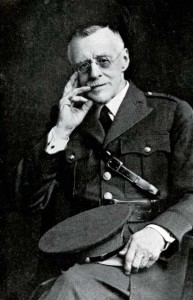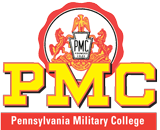For several years, Theodore Hyatt had suffered from stones in his urinary tract. On December 28, 1887, Professor William Forbes of Jefferson Hospital, performed the delicate surgery of removing these stones. At first the surgery appeared to be successful, however, two days later, Hyatt’s heart failed. Surrounded by family, he passed quietly on December 31. Hyatt’s casket rested upon a catafalque in the main corridor of Old Main, with members of the Class of 1888 posted as a guard of honor. Described as a “grand, good and noble,” man, more than two thousand persons paid their respects to his memory as his casket, followed by the PMA Cadet Corps, was taken by a hearse through the streets of Chester to the Chester Rural Cemetery.
For 35 years Hyatt’s commanding presence and dynamic leadership had provided direction for the school. At the time of his death, PMA was “one of the best-known and best-established military academies in the country.” At a meeting in Philadelphia, the Board of Trustees unanimously elected Charles E. Hyatt to succeed his father as President of Pennsylvania Military Academy in February, 1888.
Charles E. Hyatt had been a graduate of the Class of 1872. After graduation he was appointed to teach mathematics, elocution and tactics at PMA. In 1873, he became Adjutant and in 1876 he was appointed treasurer and Professor of Rhetoric. By 1881, Charles Hyatt was the Vice-President. Upon becoming President, he was given the rank of Colonel of Infantry by the Governor of Pennsylvania. In 1923, Pennsylvania Governor Gifford Pinchot was authorized by the legislature to make Hyatt a Brigadier General.
Hyatt had every intention of continuing the traditions of his father. He also believed that military training was considered the best form of education. However, he held onto his belief that it was more important to make a man than to educate a mind. To accomplish this objective, Hyatt preferred close personal contact with the Cadets. Almost immediately he began a series of small but significant changes at PMA. The daily schedule of the Cadet was modified. Reveille was moved from 6:00 to 6:30 a.m., and the morning study period (6:30 to 7:30 a.m.) was abolished. Cadets on the Merit List were also permitted to wear stars on the collars of their uniforms to signify their academic accomplishments.
Although the younger Hyatt may have been warmer and kinder, he was a firm disciplinarian. Previously, although prohibited, the rule against drinking alcohol was rarely enforced. New regulations prohibiting alcohol clearly stated that “The penalty for the violation of this rule (forbidding the use of alcohol) is expulsion.” In addition, Cadets were discouraged from using tobacco because it was considered to be “injurious” to their health. This ban lasted until 1929.
At the same time as Hyatt was making changes to Cadet regulations, he began to increase the average age of all students. This was done in part to make the school more like a college. It also aa response to the alumni concern that the name “Academy” diminished the value of their degrees. By 1892, the Pennsylvania Legislature granted the school “all the powers of a Military University.” The Board of Trustees then petitioned the courts to change the name to Pennsylvania Military College.
Hyatt’s interest in mounted drill resulted in the purchase of cavalry horses and in cavalry drill being added as an optional course to the program in 1889. Lt Beverly W. Dunn, U.S. Light Artillery, was on the military staff at the time and was chosen to be one of the instructors. In 1897, the John C. Bergfels medal and competition were introduced. This coveted prize was the awarded to that Cadet most proficient in horsemanship and cavalry drill. This challenging and exhausting competition, lasting two days, was open to the public and often attracted thousands of spectators.
Since 1869, the War Department had sent Army staff and equipment to PMA. There was, however, no method of evaluating their effectiveness. That changed in 1889. A team of inspectors, led by Lt. William P. Duvall, Fifth Artillery, from the War Department’s Inspector General’s office came to PMC. The school did well. When Brigadier General Joseph C. Breckenridge, the Inspector General of the Army, conducted the inspection in 1896, he reported “The military instruction of this school is of a superior type … The corps was a specially interesting and intelligent body of young gentlemen….” The results of future inspections were similar and in 1903 PMC was named one of the ten distinguished military institutions in the country.
The nineteenth century came to a close with the Spanish-American War. PMC Alumni responded to this conflict as expected and their military record strengthened the school’s reputation. As the new century opened, Hyatt still had much to do, but PMC was considered to be “nearly on a par with West Point.”


